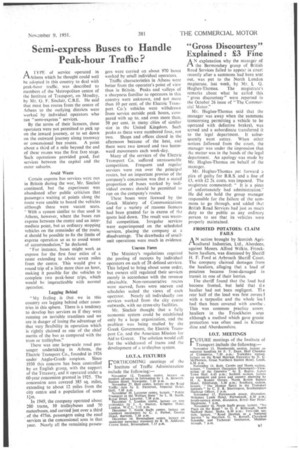Semi-express Buses to Handle Peak-hour Traffic?
Page 35

If you've noticed an error in this article please click here to report it so we can fix it.
ATYPE of service operated in Athens which he thought could well be adopted in this country to deal with peak-hour traffic, was described to members of the Metropolitan centre of the Institute of Transport, on Monday, by Mr. G. F. Sinclair, C.B.E. He said that most bus routes from the centre of Athens to the outlying districts were worked by individual operators who ran "semi-express" services.
By the terms of their licences, these operators were not permitted to pick up on the inward journey, or to set down on the outward journey along tramway or concessional bus routes. A point about a third of a mile beyond the end of these routes was the first fare stage. Such operations provided good, fast services between the capital and the outer suburbs.
Avoid Waste Certain express bus services were run in Britain during the war, Mr. Sinclair continued, but the experiment was abandoned after public criticism that passengers waiting at points along the route were unable to board the vehicles although there were vacant seats.
With a system similar to that used in Athens, however, where the buses run express between the centre and an intermediate point, but as ordinary stopping vehicles on the remainder of the route, it should be possible to fix the limits of express operation so as to avoid waste of accommodation," he declared.
"For instance, buses might work as express for the first four miles of a route extending to aboto seven miles from the centre. This would give a round trip of a little more than an hour, making it possible for the vehicles to complete two peak-hour trips, which would be impracticable with normal aperation.
Lagging Behind "My feeling is that we in this country are lagging behind other countries in this sphere. There is a tendency to develop bus services as if they were running on invisible tramlines and we are in danger of losing the advantage of that very flexibility in operation which is rightly claimed as one of the chief merits of the bus as compared with the tram or trolleybus."
There was one Large-scale road passenger undertaking in Athens, the Electric Transport Co., founded in 1926 under Anglo-Greek. auspices. Since 1930 this concern has been controlled by an English group, with the support of the Treasury, and it operated under a 60-year concession granted in 1925. The concession area covered 385 sq. miles, extending to about 12 miles from the city centre and a population of some
In 1949, the company operated about 200 trams, 10 trolleybuses and 70 motorbuses, and carried just over a third . of the 475m. passengers using the road services in the concessional area in that year. Nearly all the remaining passen
gers were carried on about 970 buses worked by small individual operators.
Traffic characteristics in Athens were better from the operator's point of view than in Britain. Peaks and valleys of a sharpness familiar to operators in this country were unknown, and not more than 10 per cent. of the Electric Transport Co.'s vehicles were withdrawn from service outside peak hours, compared with up to, and even more than, 50 per cent, in many cities of similar size in the United Kingdom. Such peaks as there were numbered four, not two. Shops and offices closed in the afternoon because of the heat, and there were two inward and two homeward movements each week-day.
Many of the services of the Electric Transport Co. suffered unreasonable competition. Frequent and regular services were run over the principal routes, but an important proviso of the company's concession was that a stated proportion of buses worked by individual owners should be permitted to run on the company's routes.
These buses were licensed by the Greek Ministry of Communications and for a variety of reasons licences had been granted far in excess of the quota laid down. The result was wasteful competition. Irregular services were superimposed on the scheduled services, placing the company at a disadvantage. The drawbacks of smallunit operations were much in evidence.
Uneven Fares The Ministry's regulations required the pooling of receipts by individual operators on each of 28 defined services. This helped to bring about some order, but owners still regulated their services merely in accordance with the revenue obtainable. Non-remunerative routes were starved, fares were uneven and schedules suited the views of each operator. Nearly all individually run services worked from the city centre outwards, with no cross-city facilities.
Mr. Sinclair thought that a fully economic system could be established only by a large organization, and the problem was being studied by the Greek Government, the Electric Transport Co. and the American Mission for Aid to Greece. The solution would call for the withdrawal of trams and the development of a trolleybus system.
F1.0.T.A. FIXTURES ORTHCOMING meetings of the Institute of Traffic Administration include the following:— November 12, Tyneside centre, lecture on modern advances in lubrication by 1. A. Howden. Station. Hotel, Newcastle, 7.30 p.m.. November 27, Hull centre, lecture on the Road Traffic -Acts by E. Patterson, Imperial Hotel, Hull, 730 P.m. November 30, Leicester centre, lecture, "Public Transport in the Welfare State' by L. H. Smith. Royal Hotel, Leicester. 7.39 p.m. December 5, London centre, lecture on tyre economies by 3. A. Stanley, Kingsley Hotel. London, W.C.1, 7.15 p.m.
December 7, North Staffs centre, lecture on transport integration by C. 3. Parker, George Hotel; Burslem, 7.30 p.m. December 10. Birmingham centre. lecture on municipal passenger transport by R. H. Addlesee. Crown Hotel, Birmingham. 7.15 p.m,




















































































